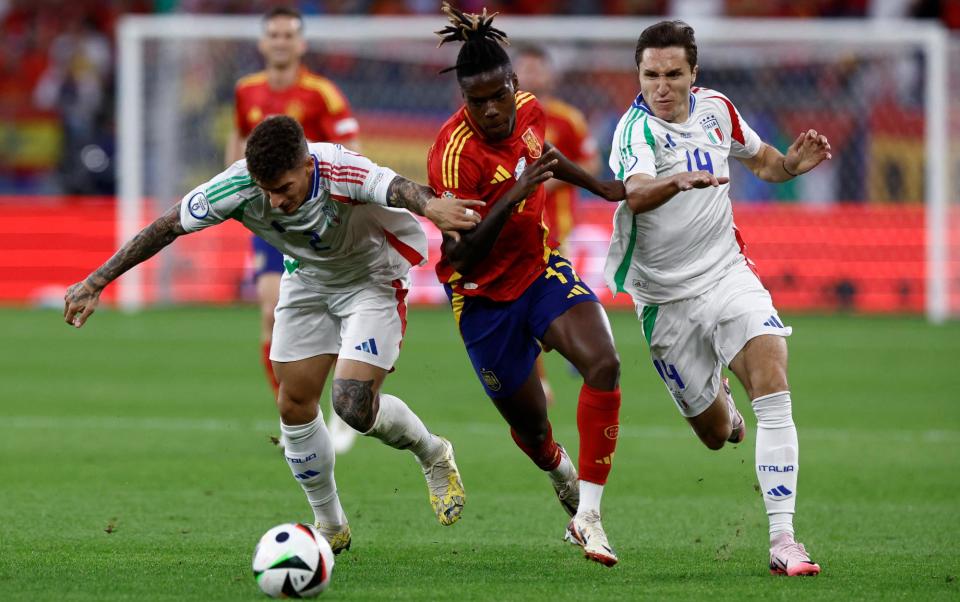Italy thankful to avoid a hammering from Spain’s deftly modern superstars

Scorelines can be great deceivers. At half-time it was 0-0 but that made little sense. It didn’t make much sense it was only 1-0 at full time. There was one side playing deft, modern football and there was one clinging on. Because that side was Italy, and because of their history and reputation, the thought lingered that perhaps they could somehow see it through. They could not.
Related: Spain qualify for last 16 after Riccardo Calafiori’s own goal floors Italy
These meetings have become something of a Euros tradition. Spain beat Italy on penalties in the quarter-final in 2008, a game that, given their complex about the Italians, was seen as a pivotal psychological moment in Spain’s ascent to winning three tournaments in a row, and since then the nations have met at least once in every Euros. They drew in the group then Spain won 4-0 in the final in 2012, Italy won 2-0 on the day England lost to Iceland in Euro 2016, and then Italy put Spain out on penalties in the semi-final three years ago. Which perhaps justifies the Spanish paranoia about the Italian capacity to defy logic and find a way: Italy had won only one of their previous 11 meetings and yet had somehow eliminated them in each of the past two Euros.
For Italy, meanwhile, the sense of these games at five successive Euros is of pre-eminence lost – they were the reigning world champions at the time of the quarter-final defeat in Vienna – and then, at least before Thursday, a slow closing of the gap as the Spanish philosophy fell out of fashion; even Spain don’t play like Spain these days. Not since the 60s have grand theories been the Italian way; Coverciano continues to produce implausible numbers of first-rate coaches but they tend to be pragmatists rather than ideologues.
In that regard this was Italy’s biggest game since the final of the last Euros, less for the result than for the performance and the opportunity to measure themselves in proper competition against an undisputed member of the elite. Although there have been decent results in the Nations League, notably wins over England, Hungary and the Netherlands, they failed to qualify for the last World Cup and were twice comprehensively beaten by England in the qualifiers for this tournament.
The second of those defeats, it should be said, came just a couple of months after Luciano Spalletti had stepped in as coach following the resignation of Roberto Mancini and the sense has been of gradual improvement since. But it’s one thing to hold Ukraine to a 0-0 draw, to secure qualification or to overcome an early shock to beat Albania in the first group game, quite another to take on Spain.
Italy are, notoriously, slow starters, but that used to mean in tournaments as a whole rather than in every game. Having fallen behind after 23 seconds against Albania, they allowed both Pedri and Nico Williams free headers from six yards out within the first 10 minutes. But that was no aberration; that was just the pattern of the game.
Related: Spain have the best players and team has no limits, De la Fuente warns rivals
Once the brain had readjusted after England’s 1-1 draw with Denmark to watching two teams who could actually pass a ball, the supremacy of Spain was obvious. Poor Giovanni Di Lorenzo was given a terrible chasing by Williams, with Federico Chiesa’s attempts to cover just inviting Marc Cucurella forward. It quickly became apparent that for Italy this was about survival.
But that’s not a position with which Italy are unfamiliar. Even against the new, more direct Spain the likelihood was always that they would have less possession. In a sense the start just simplified matters. Dig in, hope Gianluigi Donnarumma could keep making saves and get up quickly after clearances to support Gianluca Scamacca. Even the best can start to lose belief if you can thwart them for long enough.
But the red waves kept coming after half-time. This was a chastening evening for Italy, a night of chasing and hoping. Somehow they even applied some late pressure with a couple of corners, but they could have taken a hammering. The only good news is that they did keep the score down. A draw with Croatia in the final group game will take them through. Yet the result of the quadrennial test was clear, and from an Italian point of view, it wasn’t pretty.

